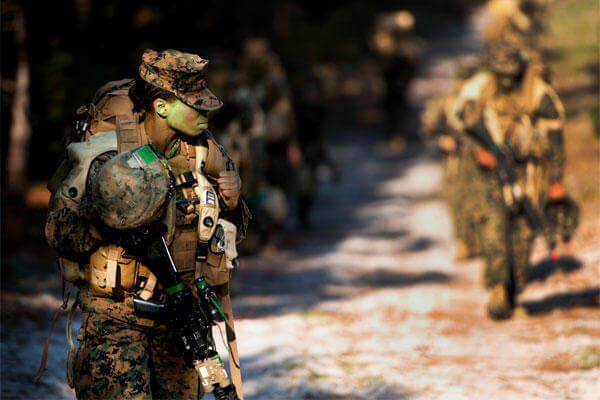The U.S. Marine Corps lost its bid to keep some combat fields closed to women, but officials said the service will waste no time in adapting to the new policy.
Headquarters Marine Corps issued a statement Thursday announcing the service's intention to align itself with the policy change immediately, and to share its plans and lessons learned with the other services to help with their integration process.
"We are well-informed by our combat experience, as well as our objective approach and data obtained from the past two years of study," Marine Corps spokesman Capt. Philip Kulczewski said in the statement.
"As we move forward with full integration, we'll continue to maintain our standards, while leveraging every opportunity to optimize individual performance, talent and skills to maximize the warfighting capabilities of our [Marine air-ground task forces] in an increasingly complex operating environment," he said.
The same outlook applies to the Marines' elite special operations unit.
"Our party line is, we're in lockstep with the Marine Corps on this," said Capt. Barry Morris, a spokesman for Marine Corps Forces Special Operations Command. "Once they roll the implementation plan out, that will let everybody know what MARSOC is doing."
Defense Secretary Ashton Carter's historic announcement Thursday that all military combat jobs would open to women at the start of next year has the most impact for the Corps, which was the only service to request exceptions to a Defense Department-wide combat integration mandate set to take effect Jan. 1.
Of the U.S. military's 52 remaining military occupational specialties to be opened to women, 22 are in the Corps -- the most of any service -- followed by 19 in the Army, six in the Air Force and five in the Navy, according to information released by the Pentagon.
"While the Marine Corps asked for a partial exception in areas such as infantry, machine gunner, fire support, reconnaissance, and others, we are a joint force, and I have decided to make a decision which applies to the entire force," Carter said during a briefing at the Pentagon.
This fall, the Marines released preliminary data from a lengthy research study showing that combat units with female members underperformed all-male counterpart units in nearly every capacity -- women, for example, were found to be more injury prone than men at certain tasks. However, the study's methodology was criticized and Carter characterized the research as "not definitive."
Chairman of the Joint Chiefs Marine Gen. Joseph Dunford, who oversaw the request for exceptions earlier this year during his tenure as commandant of the Marine Corps, notably did not appear beside Carter during his Pentagon announcement.
But a Marine official said the Corps has had implementation plans ready since the end of last year to proceed with any determination Carter made. The official, who requested anonymity because he was not authorized to speak publicly on the matter, said the Marine Corps had assembled operational planning teams last year to develop three separate courses of action based on the secretary's decision.
"It was basically, ‘if this, then that,'" the official said of the planning process. Marine planners examined questions ranging from whether assignment to various combat job fields should be voluntary or involuntary to how gender integration of ground combat units might affect recruitment and how to place female leaders within previously all-male units.
Those options were ultimately put before the commandant of the Marine Corps, who will make a final decision on how to proceed following Carter's announcement.
With a force of just 6 percent women, an institutional resistance to change and a variety of physically demanding combat jobs, the Marine Corps is positioned to be one of the most intensive testing ground for combat integration.
Carter alluded to several challenges the Corps and other services may face as they prepare to meet the integration deadline.
"We will have to address the fact that some surveys show some service members, men and women, worry integration would come at the cost of combat effectiveness," he said. "Leaders have to be clear that mission effectiveness comes first."
Carter also noted that the physical differences between men and women were real and meant that only a small number of women might qualify to meet the physical standards of certain combat jobs.
However, the secretary said the data from the Marines' ground combat integration study was not enough to justify keeping certain fields closed to women.
"I came to a different conclusion with respect to those specialties in the Marine Corps," Carter said during the press conference. "I believe that we could, in implementation, address the issues that were raised."
Results of experimental efforts to qualify female Marines for combat have so far been mixed.
During a two-year period from 2013 to 2015, enlisted female volunteers made it through infantry training in North Carolina at a rate of 36 percent, compared to a 99-percent pass rate for male Marines. And over a two-and-a-half year testing period, none of the female officers who attempted the Infantry Officers Course were able to complete it.
The Marine Corps does have one advantage over the other services, however. The service has dozens of female Marines who spent time in experimental integrated ground units as part of its integration study and are familiar with those units' conditions and physical demands.
And multiple volunteers from that experiment have indicated their willingness to move into active ground combat units if they are offered the opportunity.
One of the infantry volunteers, Lance Cpl. Callahan Brown, said she would jump at the chance to return to a Marine grunt unit.
"Anything, just to be back there doing that exact same stuff," she said.
-- Hope Hodge Seck can be reached at hope.seck@military.com. Follow her on Twitter at @HopeSeck.






























